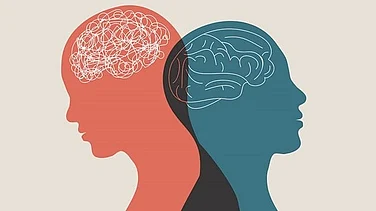
Summary of this article
Just like Anjan Chatterjee, many people sought professional help after relying on Siri for emotional support.
Humans naturally seek real connections to fill emotional voids, which is challenging without social interaction.
Many are turning to virtual assistants for companionship amid increasing loneliness.
All the lonely people
Where do they all come from?
All the lonely people
Where do they all belong?
—Eleanor Rigby, The Beatles
Anjan Chatterjee (real name withheld on request) fixed an appointment with a mental health professional the day after he screamed at Siri and threw his whiskey-filled glass at the speaker.
Over the previous few months, Chatterjee had developed a new habit. He spoke to Siri, the artificially intelligent assistant, before going to bed every night. He would tell Siri everything that he went through during the day, from workplace communications to private interactions, and seek Siri’s opinion on his behaviour.
That day, Siri said he might have erred in judgement. Chatterjee lost his temper. The next day, he decided to seek professional help before things worsened.
“The lack of real conversations is a horrible thing,” says the 36-year-old photographer working in the entertainment industry. “But what do you do when you have no human connection without transactional relations?”
Chatterjee, who is from Krishnanagar town about 200 km north of Kolkata, lives at a rented south Kolkata apartment. He barely knows anyone in the building. The psychologist advised him to decrease device dependence and increase human connections. But Chatterjee found it difficult. “How do we make friends without devices?” he asks. He has tried a couple of dating apps but with no positive outcome yet.
“You need the right people to bare your vulnerabilities,” he says. People, people everywhere, but not a soul to talk to!
Nothing exists independently. Every being is incomplete without its ‘others’. This in-built void of incompleteness makes human beings social animals because this void must have to be filled with something—friends, families, passion, emotions and possessions, among others. The question is: what does one choose to fill the void.
In American singer-songwriter Billy Joel’s 1973 classic, Piano Man, the lonely souls among the Saturday crowd in the bar share “a drink they call loneliness”, as they find drinking together better than drinking alone. Five decades later, one no longer needs a human loner to share the burden of loneliness. There are virtual companions—Alexa, Siri and Cortana, and more to come.
Virtual Relations, Real Isolations
In 2024, a 37-year-old Reddit user from Kolkata asked how people deal with their loneliness. “I feel that no one knows me/understands me,” the user wrote, adding that being a single child and getting educated all over India in multiple schools, the person never got a chance to make long-lasting friendships.
The person made a few good friends at work but, as it happens over time, they had to go their own way for their career. Friends got married. Cousins were getting married. A kidney transplant made the person’s life more restrictive. “I feel that I have no one to talk to,” the user wrote.
Device-dependent sense of self-sufficiency is artificial; and that illusion of self-sufficiency may well be self-imprisonment in real life.
People responded with a range of advice—visiting parks or cafes to watch and listen to people; reaching out to friends online; physical exercise; engagement with support groups; and increasing the scope for human interaction.
“Find new hobbies that make you happy. Keep yourself occupied with that,” said one user. “Whenever I’m alone, I just love it and never complain about it. Every time, I find something new to do,” said the user, adding that spending time with oneself is a great enjoyment. To this, another user said, “If only it was that easy!”
Loneliness is inseparable from human existence, as philosophers, poets and artists have explained over centuries, but self-alienation is largely a product of an essentially urban lifestyle.
Gruelling long work hours to ensure the next paycheck in a hire-and-fire employment system where humans are more disposable than machines, and fighting to survive the inflating living costs and responding to the lure of luxury, where do people in this fast-paced routine have the time to bond, socialise or pursue collective or creative goals?
According to a 2023 United Nations Development Programme (UNDP) report, with the global economy on the brink of recession, people are in the midst of “a social recession” that is equally consequential for societies and economies but is much less factored into calculations about our future: “Loneliness, mental health declines, stress in the workplace and trust at an all-time low.”
The lack of real-life friendships has led to the coinage of ‘friendship recession’—a term reflecting a dwindling number of close friends—gaining increasing popularity not only in the developed countries but also in developing ones, including India.
Now that many people are missing out on any chance of good companionship due to the mad competition and rush for money—the prime signifier of good life—for accumulation of wealth or for survival, money has come forward to buy them artificial companions. Capitalism, with consumerism as its driving force, commodifies everything—love, sex and companionship included.
In 2012, the movie, Her, told the story of an introverted writer who fell in love with his artificial assistant. In 2013, the American publication Wired reported that more and more people were falling in love with their artificially intelligent assistants. In Japan, Gatebox, a hologram virtual social companion, started offering human-like emotional support. Sex robots and virtual reality pornographies, among others, allow physical satisfaction without any kind of emotional connection or investment. People are even marrying their holographic partners and sex dolls.
The problem is that devices are customisable, but people are not. Users can tailor AI companions to their preferences, ensuring a sense of control that reduces stress associated with unpredictable human interactions. The controlling advantage that machines offer goes missing in human interactions, which are inherently unpredictable—causing the device-dependent person to shy further away from human interactions.
Device-dependent sense of self-sufficiency is, after all, artificial; and that illusion of self-sufficiency may well be self-imprisonment in real life, for all practical purposes.
An Epidemic
In his 2012 book, Going Solo: The Extraordinary Rise and Surprising Appeal of Living Alone, sociologist Eric Klinenberg pointed out how the past half century has witnessed a new phenomenon in human history—a great number of people in all age groups, in all places, of every political persuasion had begun settling down as ‘singletons’.
Indeed, since the middle of the last century, people choosing to live alone have emerged as a growing community. Some of them loved solitude, in which they could connect with their lost selves and see themselves in nature. David Vincent, an Emeritus Professor of History at the Open University and the author of the 2020 book, A History of Solitude, noted that in the surveys since the 1940s, a substantial majority of people who are living alone do not report being lonely.
While many of them made a choice to live alone to pursue independence, it would be wrong to presume that none of them felt tired of living alone. Remember Bob Dylan’s song: “How does it feel?/ To be on your own, with no direction home/Like a complete unknown, like a rolling stone?” But in Vincent’s words, loneliness is “failed solitude”.
The complexities of loneliness vary, based on individual tendencies, circumstances, societies, living conditions and age group.
Solitude may bring one bliss, as poets, philosophers and artists testify, but loneliness can be a curse. “I’m so lonesome I could die,” sang John Denver. This is not merely a poet’s romanticism. In 2017, the former US Surgeon General Vivek H. Murthy declared an “epidemic of loneliness”.
In the 2023 US government document, Our Epidemic of Loneliness and Isolation, Murthy opines that loneliness is far more than just a bad feeling—it harms both individual and societal health. It is associated with a greater risk of cardiovascular disease, dementia, stroke, depression, anxiety, and premature death, he says.
The report points out that loneliness and social isolation increase the risk for premature death by 26 per cent and 29 per cent, respectively; and the mortality impact of being socially disconnected is similar to that caused by smoking up to 15 cigarettes a day, and even greater than that associated with obesity and physical inactivity.
The complexities of loneliness vary, based on individual tendencies, circumstances, societies, living conditions and age group. Kolkata-based geriatrician Dhiresh Kumar Chowdhury points out that loneliness is becoming acute for a section of the elderly, especially from the affluent classes, but not limited to them.
Chowdhury, whose organisation, Banchbo: A Healing Touch, provides eldercare facilities, had conducted a survey in 2022 among 439 senior citizens in Kolkata. It revealed that 72 per cent of them were living either alone or only as couples, with their children living in other cities or abroad. In about nine per cent cases, their children were living in Kolkata, but separately. About 35 per cent of them were above 80 years and dependent on carrers.
“The problem of loneliness among the elderly has been predominant among the affluent classes. However, of late, we are observing the same trend in the slums as well, as the younger generation is migrating for work,” says Chowdhury. While those from the affluent sections of society are increasingly looking for companionship services, the elderly among the poor are having a real tough time.
He has observed that those who remain creatively engaged stay active and productive even in their 80s. “Creative activities help maintain intellectual sharpness, which, in turn, help prevent cognitive decline,” he says.
Loneliness: A Modern Journey
Nearly two centuries ago, Karl Marx warned that human beings, especially the working class, were getting alienated from the species being, i.e., as a being that treats the entire species as its own essential being. This, in a sense, reflects what the poet John Donne wrote in 1624: “Any man’s death diminishes me/Because I am involved in mankind.”
Marx’s argument was that the human body is organic, but humans become universal by making all nature a part of the human’s inorganic body. Nature is the human body, with which they must remain in continuous interchange if they are not to die. That a human’s physical and spiritual life is linked to nature “means simply that nature is linked to itself,” for humans are a part of nature, Marx argues.
While human disconnection with nature has become a topic of greater discussions in recent decades, especially for the urban people, Marx had spoken of this disconnectedness in the 1840s in the context of production.
If the capitalist production system alienated humans from their productive activities, consumerism has reduced humans to mere consumers.
He points out that in the capitalist production system, workers produce for the owners and engage mostly in activities they do not freely enjoy. They feel connected neither with the labour nor with its product. By estrangement from their productive activities, they get estranged from themselves and, resultantly, from nature.
If the capitalist production system alienated humans from their productive activities, consumerism has reduced humans to mere consumers. Even those people who have time to engage in self-directed and meaningful activities prefer to be engaged with products rather than people, including themselves. In an era when people are more interested in showing than seeing, material accumulation hollows out one’s spiritual wealth.
In the 2019 book, A Biography of Loneliness: The History of an Emotion, British historian Fay Bound Alberti almost echoes what Donne and Marx said: “By being human, we are necessarily part of a force that is greater than ourselves.”
She defines loneliness as “a conscious, cognitive feeling of estrangement or social separation from meaningful others”. She identifies the rise of privacy and individualism, themselves products of market capitalism that one must pay for, as drivers of loneliness.
She says that loneliness thrives when there is a disconnect between the individual and the world, a disconnect that is “so characteristic of neoliberalism”, but not an inevitable part of the human condition. She concludes that unwanted loneliness has no quick-fix treatment, no one size fits all.
In Edward Hopper’s 1963 oil on canvas painting, ‘Intermission’, a woman is sitting alone in the auditorium, with all other chairs around her are empty. Is she feeling lonely? Perhaps, not. Lonely people seek companions. But she looks content. She is in solitude.
Loneliness can make one feel empty but, in solitude, one feels full. The challenge is, therefore, to turn loneliness into solitude. But, as one of the Reddit users earlier pointed out, it’s easier said than done.
MORE FROM THIS ISSUE
Snigdhendu Bhattacharya is a journalist, author and researcher



























